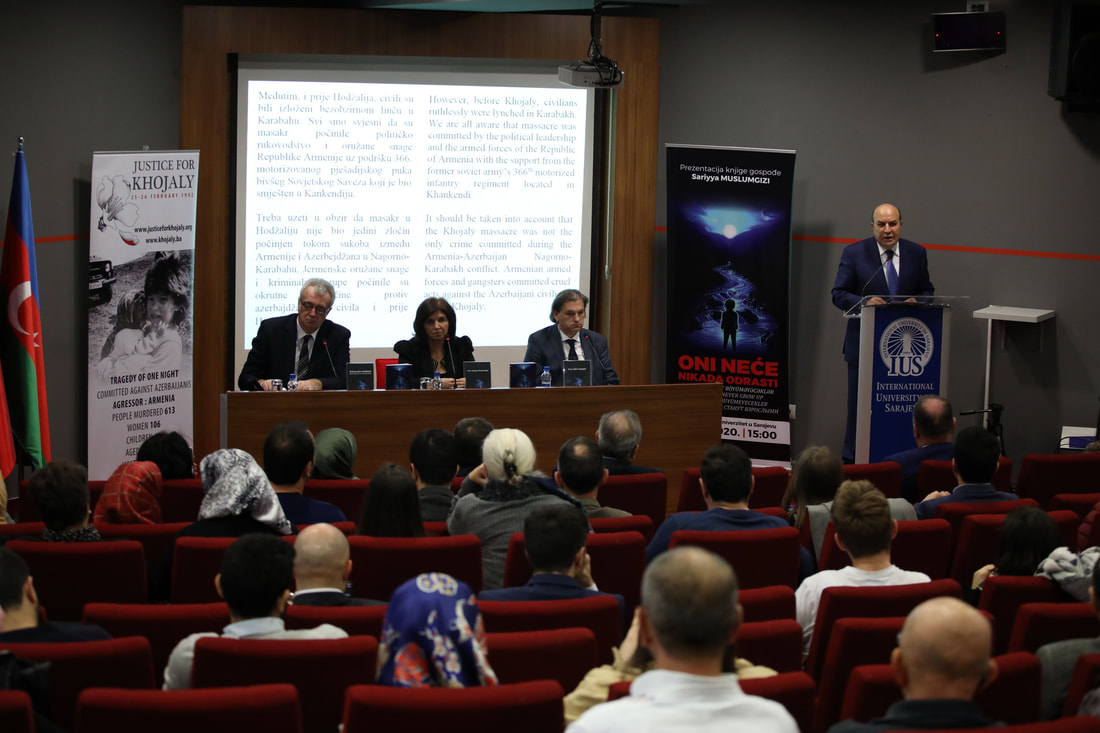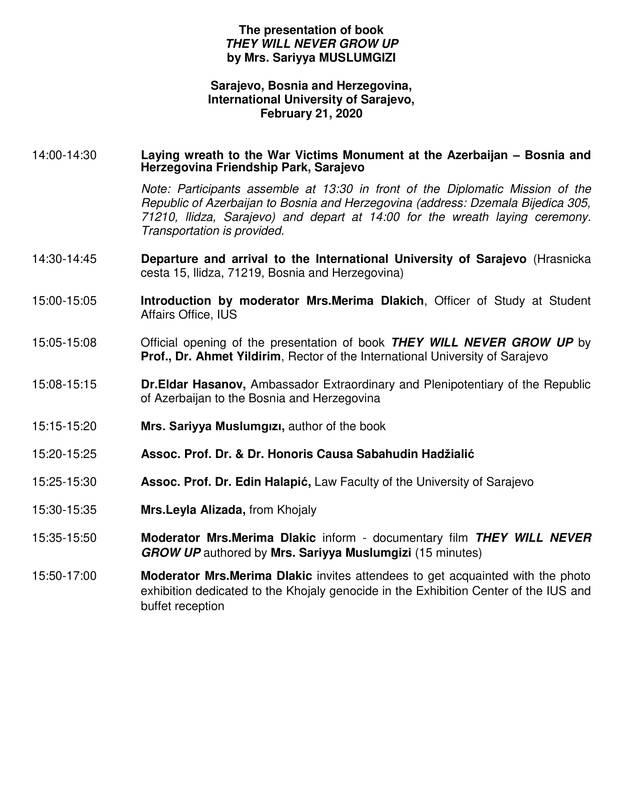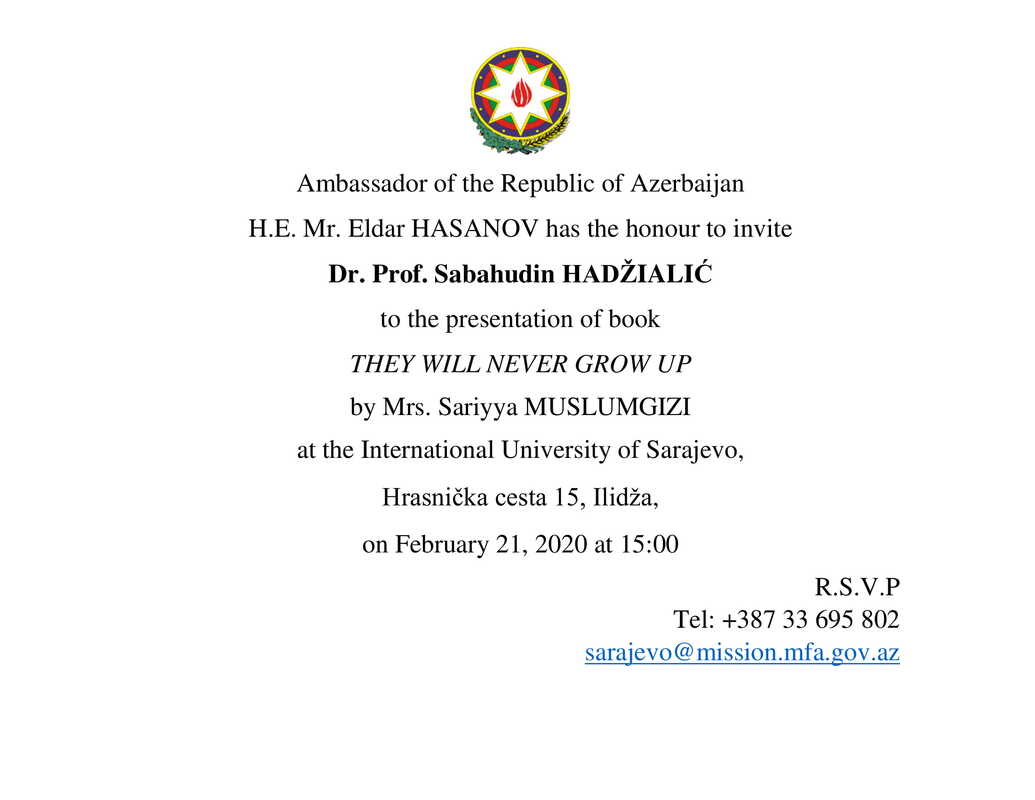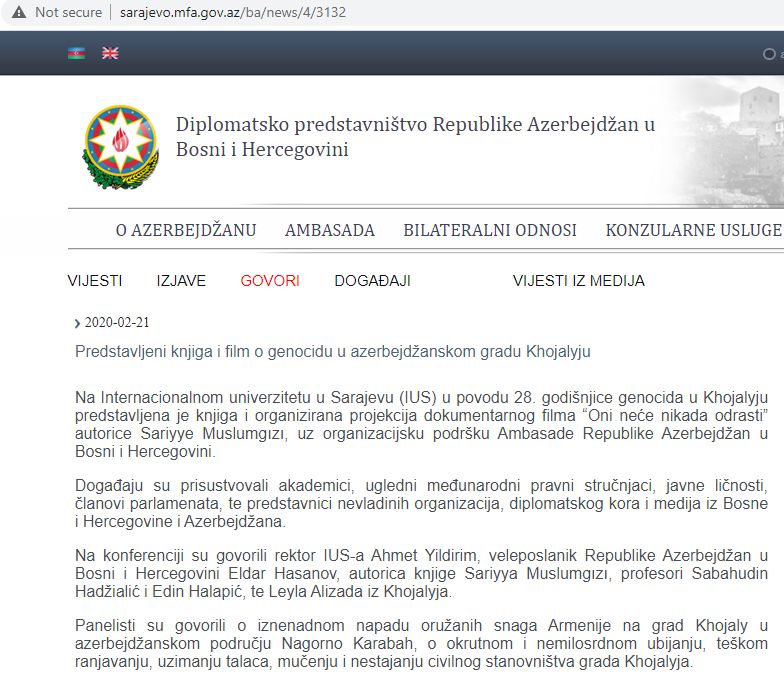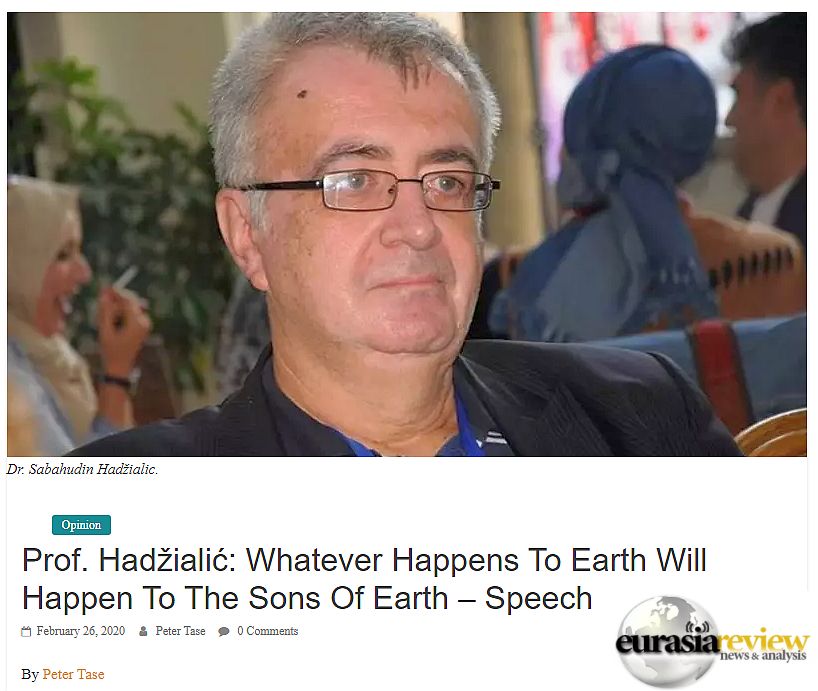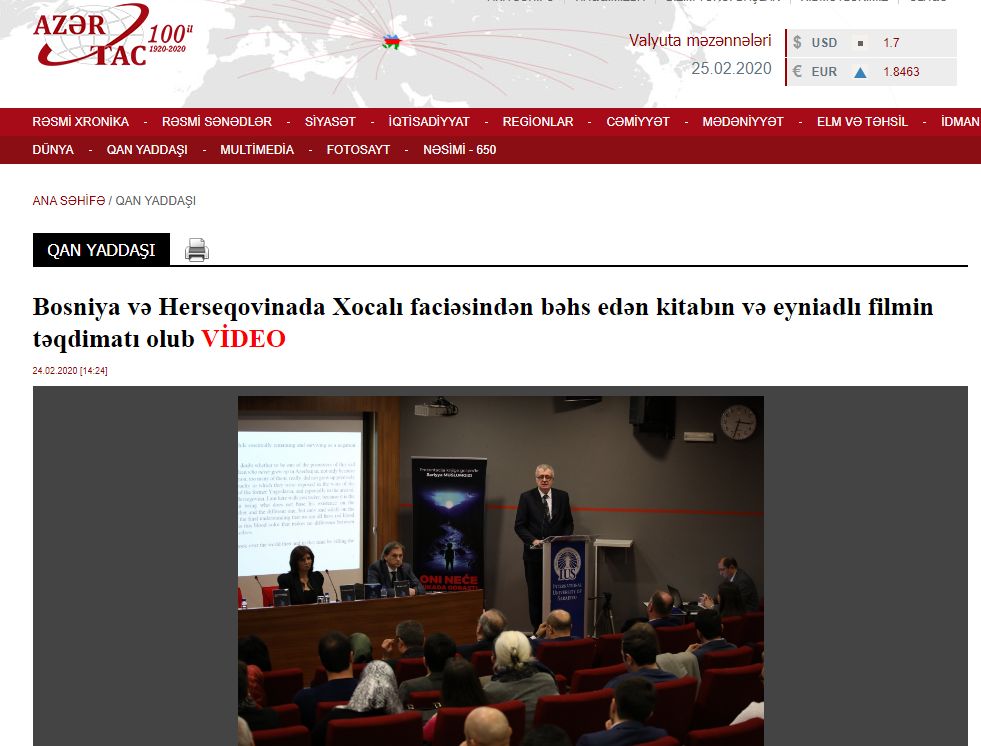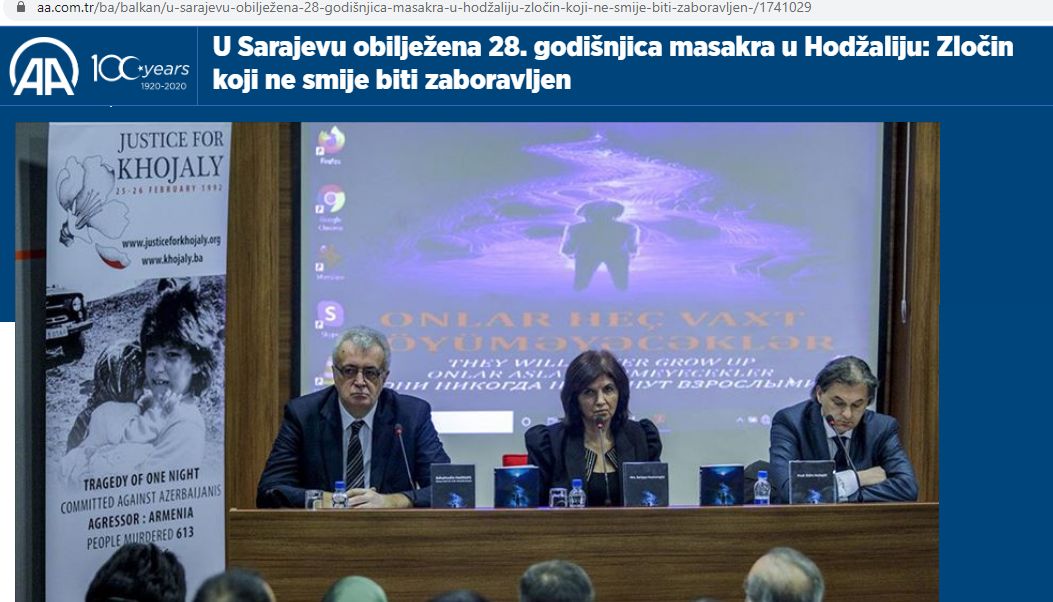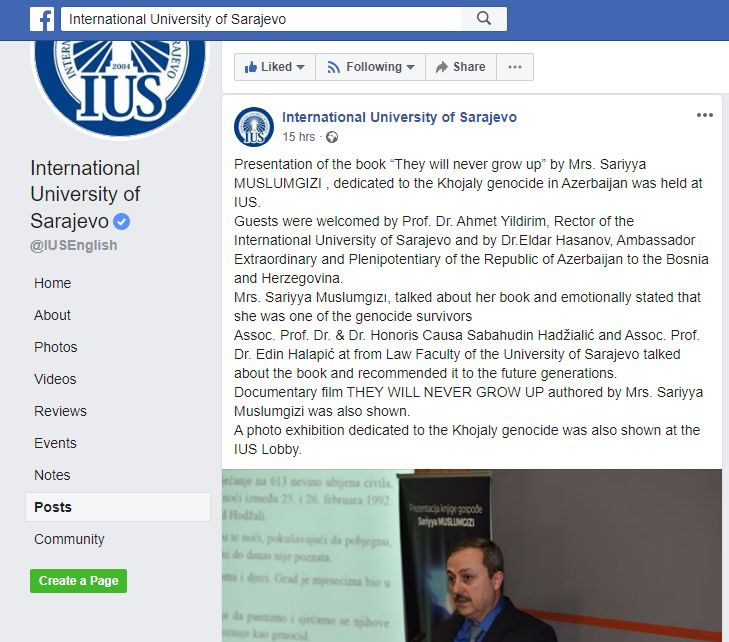21.02.2020.g.
PREDSTAVLJANJE KNJIGE
Sariyye MUSLUMGIZI
„Oni nikada neće odrasti“
pod pokroviteljstvom
Ambasade Republike Azerbejdžan
u Bosni i Hercegovini
Programme
| khojaly_book_-_21.02.20_-_programme_eng.pdf | |
| File Size: | 273 kb |
| File Type: | |
Assoc. Prof. Dr. & Dr. Honoris Causa Sabahudin Hadžialić, prof.
Tekst pročitan na predstavljanju knjige na IUS-u, 21.2.2020.g., Sarajevo, BiH
„Oni nikada neće odrasti“
Sjećanje je vječnost. Godina su imali od 4 do 18. Život im se otvarao, ali nestadoše u sjećanju. Zbog vječnosti. Kako naše, tako i njihove.
Upravo zbog uobličavanja pretpostavki koje obilježavaju vječnost globalne patnje samo zbog činjenice da je drugi i drugačiji neprijatelj koji treba nestati, bez mogućnosti pronalaženja kompromisa, mali ljudi - djeca Azerbejdžana su postala veliki, nikada prežaljene osobnosti koje su upravo hodile putem inicijalne kreacije, kreiranja puta života, ali...
Tamo gdje nema međusobne komunikacije, nastaju mogućnosti prvo verbalnog, a zatim i fizičkog konflikta bez obzira gdje se nalazili na prostorima ovog našeg svijeta, ispunjenog kontinuiranih grijehom – upravo konflikta, koji samo mijenja oblike pojavnosti, dok u suštini ostaje i opstaje kao negacija humanosti per se.
Ni jednoga trenutka se nisam dvoumio da li da budem jedan od promotora ove tužne sage o patnji djece koja nikada nisu odrasla iz Azerbejdžana, i to ne samo zbog toga što ni djeca ovih prostora, itekako veliki dio njih, nije odrastao upravo zbog patnje i surovosti kojoj su bili izloženi u ratovima devedesetih godina na prostorima bivše Jugoslavije, a posebno na prostoru naše domovine, Bosne i Hercegovine. Danas sam ovdje sa vama, jer to je obaveza svakog čovjeka koji svoje postojanje ne zasniva na isključivosti prema drugom i drugačijeg već samo i jedino na usmjerenosti konačnog razumijevanja da smo svi crvene boje krvi ispod kože i da upravo ta boja krvi ne pravi razlike među ljudima, do ljudi sami.
Provincije duha su ovladale svijetom tada ubijajući duh razumijevanja.
Ni danas, 2020.g. nismo daleko od navedenog, jer nikako da razumijemo jer upravo i danas, dok ovo ja govorim, 21.2.2020.g. provincije duha miniraju groblja Indijanaca u Sjedinjenim Američkim Državama, a po nalogu aktuelnog predsjednika Donalda Trumpa, kako bi izgradili čuveni Trumpov zid prema Meksiku, čineći svetogrđe i zaboravljajući riječi Indijanskog poglavice imena Seattle navedene u pismu, ali i govoru, upućenom američkom predsjedniku Franklinu Piercu 1854.g. citat: Morate naučiti svoju djecu da je tlo pod njihovim stopama pepeo njihovih djedova. Tako da bi oni poštivali zemlju, recite vašoj djeci da je zemlja s nama u srodstvu. Učite vašu djecu kao što činimo mi s našom da je zemlja naša majka. Što god snađe nju snaći će i sinove zemlje. Ako čovjek pljuje na tlo pljuje na sebe samoga. To mi znamo: zemlja ne pripada čovjeku; čovjek pripada zemlji. To mi znamo. Sve stvari povezane su kao krv koja ujedinjuje obitelj. Sve stvari su povezane. Što god snađe zemlju snaći će i sinove zemlje. Čovjek ne tka tkivo života; on je samo struk u tome. Što god čini tkanju čini i sebi samome.“ kraj citata. Koristim ovu priliku i da javno osudim skrnavljenje groblja Indijanaca na granici sa Meksikom, upravo sada i ovdje, u Sarajevu, koje se čine u ime građana nama prijateljske i bliske zemlje, SAD-e. Zbog toga je vrijeme da skinemo rukavice i nazovemo stvari pravim imenom, radi opstanka civilizacije koja se konstanto ubija i razara, počevši od početka XX vijeka i nastavlja i u ovom, XXI vijeku. Bez prestanka.
No, i horde zla koje su ubile djecu Azerbejdžana devedesetih godina prošloga vijeka/stoljeća ostaju kao civilizacijsko zlo XX vijeka i bit će im suđeno. Ova knjiga „Oni nikada neće odrasti“, autorice gđe Sariyya MUSLUMGIZI je i zbir dokaza o učinjenom.
Stradanje naroda Azerbejdžana, preko samo dijelom ispričane refleksije o patnji djece i njihovih porodica, ali i naroda Azerbejdžana u ovoj knjizi, autora gđe Sariyya MUSLUMGIZI, je samo, nažalost, kontinuitet patnje koja obuhvaća ljudsku civilizaciju od njenog uobličavanja do dana današnjeg, od Holokausta tokom II Svjetskog rata i sve do dana današnjeg i genocida u Srebrenici - ali kako nazvati stradanje stotine i stotine nevinih u Kodžaliju krajem prošlog stoljeća?
Ubistvom, masakrom ili etničkim čišćenjem, obzirom da ajet iz Kurana časnog kaže: „Ko god ubije jednog nevinog čovjeka, kao da je ubio cijeli svijet! Ko god spasi jednog čovjeka, kao da je spasio cijeli svijet!“ Gdje je civilizacija bila kada je svijet ubijan ne jednom već više hiljada puta u Srebrenici, ali i u manjem broju i na drugim stratištima naroda u Bosni i Hercegovini, od Ahmića u Srednjoj Bosni, preko Kazana u Sarajevu, Heliodroma u Mostaru i sve do Briševa kod Prijedora ili Uzdola kod Prozora?
Potrebna je katarza, objedinjujuća katarza, počevši od svih onih koji su činili najviše zločina, a Međunarodni sudovi to meritorno osudiše, i sve do onih koji su ubili samo jednog čovjeka, ženu, dijete, bilo gdje na svijetu, počevši od nas samih, ovdašnjih. Da li je dovoljno da ja, kao Musliman, sam kleknem i kažem - da, žao mi je za sve zločine koje su u moje ime činili Muslimani u ratu devedesetih u Bosni i Hercegovini? A činili su. Jer i ako si ubio jednog nevinog čovjeka, ali i ženu, dijete, u ratu, ti si ratni zločinac Ne, to nije dovoljno jer je potrebno da to učini i druga, i treća strana u konfliktu.
Šta bješe sa djecom Azerbejdžana? Azerbejdžanska vojska nije bila u Armeniji i ubijala tamo. Bosanac i Hercegovac nije išao u Srbiju, ali i u Crnu Goru, pa i u Hrvatsku i ubijao tamo tokom ratova devedesetih. Ne, oni su došli ovdje i pokušavali, preko vlastitih, nikada realno razumijevajućih mitova, ubiti ovdašnje ljude, žene, djecu. Bez obzira na ime i prezime koje nose. Naročito u Sarajevu, ali i širom Bosne i Hercegovine.
No, gdje je civilizacija bila kada je svijet ubijan ne jednom već više stotina puta u Kodžaliju u Azerbejdžanu? Gdje?
Zaista sam bio iskreno ganut čitavši autorske retke Mrs. Sariyya MUSLUMGIZI – o velikim ljudima, djeci koja nikada odrasla nisu. Neću govoriti o pojedinačnim bolima i patnjama navedenim u ovoj knjizi, jer svaka bol je posebna za sebe i zbog toga je zaista morate iščitati, a ne samo pročitati, jer je ova knjiga nedovršena, kontinuirana priča patnje. Svakim novim čitanjem stvara se nova bol, bol koja opstaje u vječnosti civilizacije kao kontinuitet.
No, vrijeme ne može ništa učiniti kada je bol Azerbejdžanske djece u pitanju. Obzirom da vrijeme ne prolazi, jer ne postoji. Mi, ljudi, prolazimo, jer smo postojali. Kako je jednom prilikom i jedan sarajevski sajdžija rekao: “Dok je ljudi, mjeriće se vrijeme.“ Da, kada ljudi budu nestali, vrijeme nestaje, ali patnja ostaje. I na prostorima Bosne i Hercegovine, ali i Azerbejdžana.
Kako prevazići patnju, barem pokušati?
Sjećanjem, koje prerasta u vječnost.
Koliko samo boli i patnje u jednom jedinom paragrafu, a romani su, ne jedan samo, svaka od priča na sva tri jezika (azerbejdžanskom, ruskom, engleskom) u knjizi „Oni nikada neće odrasti“ .
Ove i ovakve knjige su obrazovanju, od kolijevke pa do grobe, potrebne. Ove i ovakve knjige su ljudima potrebne. Bez obzira na rasu, vjeru i/ili naciju. Ne da bi mrzili druge i drugačije, već da bi spriječile ponavljanje istorije, koje je toliko bolno širom svijeta.
Moja preporuka je da ova knjiga bude prevedena na sve jezike svijeta. Radi dobrobiti čovječanstva kako se ovakve stvari nikada i nikome više ne bi ponovile, ali i da se ne zaborave, upravo zbog djece širom svijeta koja nikada odrasti neće.
Jer, sjećanje je vječnost.
Hvala vam.
Tekst pročitan na predstavljanju knjige na IUS-u, 21.2.2020.g., Sarajevo, BiH
„Oni nikada neće odrasti“
Sjećanje je vječnost. Godina su imali od 4 do 18. Život im se otvarao, ali nestadoše u sjećanju. Zbog vječnosti. Kako naše, tako i njihove.
Upravo zbog uobličavanja pretpostavki koje obilježavaju vječnost globalne patnje samo zbog činjenice da je drugi i drugačiji neprijatelj koji treba nestati, bez mogućnosti pronalaženja kompromisa, mali ljudi - djeca Azerbejdžana su postala veliki, nikada prežaljene osobnosti koje su upravo hodile putem inicijalne kreacije, kreiranja puta života, ali...
Tamo gdje nema međusobne komunikacije, nastaju mogućnosti prvo verbalnog, a zatim i fizičkog konflikta bez obzira gdje se nalazili na prostorima ovog našeg svijeta, ispunjenog kontinuiranih grijehom – upravo konflikta, koji samo mijenja oblike pojavnosti, dok u suštini ostaje i opstaje kao negacija humanosti per se.
Ni jednoga trenutka se nisam dvoumio da li da budem jedan od promotora ove tužne sage o patnji djece koja nikada nisu odrasla iz Azerbejdžana, i to ne samo zbog toga što ni djeca ovih prostora, itekako veliki dio njih, nije odrastao upravo zbog patnje i surovosti kojoj su bili izloženi u ratovima devedesetih godina na prostorima bivše Jugoslavije, a posebno na prostoru naše domovine, Bosne i Hercegovine. Danas sam ovdje sa vama, jer to je obaveza svakog čovjeka koji svoje postojanje ne zasniva na isključivosti prema drugom i drugačijeg već samo i jedino na usmjerenosti konačnog razumijevanja da smo svi crvene boje krvi ispod kože i da upravo ta boja krvi ne pravi razlike među ljudima, do ljudi sami.
Provincije duha su ovladale svijetom tada ubijajući duh razumijevanja.
Ni danas, 2020.g. nismo daleko od navedenog, jer nikako da razumijemo jer upravo i danas, dok ovo ja govorim, 21.2.2020.g. provincije duha miniraju groblja Indijanaca u Sjedinjenim Američkim Državama, a po nalogu aktuelnog predsjednika Donalda Trumpa, kako bi izgradili čuveni Trumpov zid prema Meksiku, čineći svetogrđe i zaboravljajući riječi Indijanskog poglavice imena Seattle navedene u pismu, ali i govoru, upućenom američkom predsjedniku Franklinu Piercu 1854.g. citat: Morate naučiti svoju djecu da je tlo pod njihovim stopama pepeo njihovih djedova. Tako da bi oni poštivali zemlju, recite vašoj djeci da je zemlja s nama u srodstvu. Učite vašu djecu kao što činimo mi s našom da je zemlja naša majka. Što god snađe nju snaći će i sinove zemlje. Ako čovjek pljuje na tlo pljuje na sebe samoga. To mi znamo: zemlja ne pripada čovjeku; čovjek pripada zemlji. To mi znamo. Sve stvari povezane su kao krv koja ujedinjuje obitelj. Sve stvari su povezane. Što god snađe zemlju snaći će i sinove zemlje. Čovjek ne tka tkivo života; on je samo struk u tome. Što god čini tkanju čini i sebi samome.“ kraj citata. Koristim ovu priliku i da javno osudim skrnavljenje groblja Indijanaca na granici sa Meksikom, upravo sada i ovdje, u Sarajevu, koje se čine u ime građana nama prijateljske i bliske zemlje, SAD-e. Zbog toga je vrijeme da skinemo rukavice i nazovemo stvari pravim imenom, radi opstanka civilizacije koja se konstanto ubija i razara, počevši od početka XX vijeka i nastavlja i u ovom, XXI vijeku. Bez prestanka.
No, i horde zla koje su ubile djecu Azerbejdžana devedesetih godina prošloga vijeka/stoljeća ostaju kao civilizacijsko zlo XX vijeka i bit će im suđeno. Ova knjiga „Oni nikada neće odrasti“, autorice gđe Sariyya MUSLUMGIZI je i zbir dokaza o učinjenom.
Stradanje naroda Azerbejdžana, preko samo dijelom ispričane refleksije o patnji djece i njihovih porodica, ali i naroda Azerbejdžana u ovoj knjizi, autora gđe Sariyya MUSLUMGIZI, je samo, nažalost, kontinuitet patnje koja obuhvaća ljudsku civilizaciju od njenog uobličavanja do dana današnjeg, od Holokausta tokom II Svjetskog rata i sve do dana današnjeg i genocida u Srebrenici - ali kako nazvati stradanje stotine i stotine nevinih u Kodžaliju krajem prošlog stoljeća?
Ubistvom, masakrom ili etničkim čišćenjem, obzirom da ajet iz Kurana časnog kaže: „Ko god ubije jednog nevinog čovjeka, kao da je ubio cijeli svijet! Ko god spasi jednog čovjeka, kao da je spasio cijeli svijet!“ Gdje je civilizacija bila kada je svijet ubijan ne jednom već više hiljada puta u Srebrenici, ali i u manjem broju i na drugim stratištima naroda u Bosni i Hercegovini, od Ahmića u Srednjoj Bosni, preko Kazana u Sarajevu, Heliodroma u Mostaru i sve do Briševa kod Prijedora ili Uzdola kod Prozora?
Potrebna je katarza, objedinjujuća katarza, počevši od svih onih koji su činili najviše zločina, a Međunarodni sudovi to meritorno osudiše, i sve do onih koji su ubili samo jednog čovjeka, ženu, dijete, bilo gdje na svijetu, počevši od nas samih, ovdašnjih. Da li je dovoljno da ja, kao Musliman, sam kleknem i kažem - da, žao mi je za sve zločine koje su u moje ime činili Muslimani u ratu devedesetih u Bosni i Hercegovini? A činili su. Jer i ako si ubio jednog nevinog čovjeka, ali i ženu, dijete, u ratu, ti si ratni zločinac Ne, to nije dovoljno jer je potrebno da to učini i druga, i treća strana u konfliktu.
Šta bješe sa djecom Azerbejdžana? Azerbejdžanska vojska nije bila u Armeniji i ubijala tamo. Bosanac i Hercegovac nije išao u Srbiju, ali i u Crnu Goru, pa i u Hrvatsku i ubijao tamo tokom ratova devedesetih. Ne, oni su došli ovdje i pokušavali, preko vlastitih, nikada realno razumijevajućih mitova, ubiti ovdašnje ljude, žene, djecu. Bez obzira na ime i prezime koje nose. Naročito u Sarajevu, ali i širom Bosne i Hercegovine.
No, gdje je civilizacija bila kada je svijet ubijan ne jednom već više stotina puta u Kodžaliju u Azerbejdžanu? Gdje?
Zaista sam bio iskreno ganut čitavši autorske retke Mrs. Sariyya MUSLUMGIZI – o velikim ljudima, djeci koja nikada odrasla nisu. Neću govoriti o pojedinačnim bolima i patnjama navedenim u ovoj knjizi, jer svaka bol je posebna za sebe i zbog toga je zaista morate iščitati, a ne samo pročitati, jer je ova knjiga nedovršena, kontinuirana priča patnje. Svakim novim čitanjem stvara se nova bol, bol koja opstaje u vječnosti civilizacije kao kontinuitet.
No, vrijeme ne može ništa učiniti kada je bol Azerbejdžanske djece u pitanju. Obzirom da vrijeme ne prolazi, jer ne postoji. Mi, ljudi, prolazimo, jer smo postojali. Kako je jednom prilikom i jedan sarajevski sajdžija rekao: “Dok je ljudi, mjeriće se vrijeme.“ Da, kada ljudi budu nestali, vrijeme nestaje, ali patnja ostaje. I na prostorima Bosne i Hercegovine, ali i Azerbejdžana.
Kako prevazići patnju, barem pokušati?
Sjećanjem, koje prerasta u vječnost.
Koliko samo boli i patnje u jednom jedinom paragrafu, a romani su, ne jedan samo, svaka od priča na sva tri jezika (azerbejdžanskom, ruskom, engleskom) u knjizi „Oni nikada neće odrasti“ .
Ove i ovakve knjige su obrazovanju, od kolijevke pa do grobe, potrebne. Ove i ovakve knjige su ljudima potrebne. Bez obzira na rasu, vjeru i/ili naciju. Ne da bi mrzili druge i drugačije, već da bi spriječile ponavljanje istorije, koje je toliko bolno širom svijeta.
Moja preporuka je da ova knjiga bude prevedena na sve jezike svijeta. Radi dobrobiti čovječanstva kako se ovakve stvari nikada i nikome više ne bi ponovile, ali i da se ne zaborave, upravo zbog djece širom svijeta koja nikada odrasti neće.
Jer, sjećanje je vječnost.
Hvala vam.
English:
Assoc. Prof. Dr. & Dr. Honoris Causa Sabahudin Hadžialic
Text to read on promotion of the book at IUS, February 21, 2020
"They will never grow up"
The memory is eternity. They were ages from 4 to 18. Their life was opening for them, but they have disappeared in the memory. For the eternity. Both, ours as and as well as - theirs.
It is because of the shaping of the assumptions that mark the eternity of global suffering solely because of the fact that another and different one is the enemy who needs to disappear, without the possibility of finding a compromise, the little people - the children of Azerbaijan have become big, never got over personalities who just walked through the initial creation, creating the path of life, but ...
Where there is no communication with each other, the possibilities arise first of verbal and then of physical conflict, regardless of where you are on the areas of this world of ours, filled with continuous sin - precisely a conflict, which only changes the forms of appearance, while essentially remaining and surviving as a negation of humanity per se.
Not for a moment I did not doubt whether to be one of the promoters of this sad saga of the suffering of children who never grew up in Azerbaijan, not only because either the children of this region, too many of them, really, did not grew up precisely because of suffering and cruelty to which they were exposed in the wars of the 1990s within the territories of the former Yugoslavia, and especially in the area of our homeland, Bosnia and Herzegovina. I am here with you today, because it is the obligation of every human being who does not base his existence on the exclusiveness against the other and the different one, but only and solely on the orientation and direction of the final understanding that we are all have red blood under our skin and that it is this blood color that makes no difference between people, but the people themselves.
The provinces of the spirit took over the world then and in that time by killing the spirit of understanding.
Not even today, 2020. we are not far from the above, because we cannot understand, because today, while I am saying this, on 21.2.2020. provinces of the spirit are mining the cemeteries of the Native Americans in the United States, by order of the actual President Donald Trump, to build the famous Trump wall toward Mexico, making sacrilege and forgetting the words of the Indian (Native American) chief with the name Seattle written in the letter and speech delivered to U.S. President Franklin Pierce in 1854. . quote: “You must teach your children that the ground beneath their feet is the ashes of their grandparents. In order that they may respect the earth, teach them that the earth is full of the life of our ancestors. You must teach your children what we have taught ours: that the earth is our mother. Everything that affects the earth affects the sons of the earth. When men spit on the ground they spit on themselves. We know this. All things are bound up in each other like the blood that binds the family. All things are connected. Whatever happens to earth will happen to the sons of the earth. We know this: the earth does not belong to man; the man belongs to the earth. Man has not woven the net of life: he is just a thread in it. Everything he does to this net he does to himself.” …end of quote. I also take this opportunity to publicly condemn the desecration of the cemetery of the Indians (Native Americans) on the border with Mexico, right now and here in Sarajevo, which were done on behalf of the citizens of a friendly and close country to us, the United States. That is why it is time to take off our gloves and call it with a real name, for the survival of a civilization that is constantly in process of killing and destroying, starting at the beginning of the 20th century and continuing into this, the 21st century. Without ceasing.
But the hordes of evil that killed the children of Azerbaijan in the 1990s remain as a civilization evil of the 20th century and will be put to trial. This book, "They Will Never Grow Up," authored by Mrs. Sariyya MUSLUMGIZI is also a compilation of evidence of what has been done.
The suffering of the people of Azerbaijan, through only a partially told reflection on the suffering of children and their families, but also the people of Azerbaijan in this book, authored by Mrs. Sariyya MUSLUMGIZI, is, unfortunately, the continuity of suffering that encompasses human civilization from its formulation to the present day, from the Holocaust throughout World War II and up to the present day and the genocide in Srebrenica - but what to call the suffering of hundreds and hundreds of innocents in Kozhaly at the end of the last century?
As murder, massacre, or ethnic cleansing, since the verse of the Holy Quran reveres: “Whoever kills an innocent man, as if he had killed the whole world! Whoever saves one man, as if he saved the whole world!” Where was the civilization when the world was killed not once but in more thousands of times in Srebrenica, but also to a lesser extent at other people's killing places in Bosnia and Herzegovina, from Ahmići in Central Bosnia, via Kazani in Sarajevo, Heliport in Mostar and all the way to Briševo near Prijedor or Uzdol near Prozor?
It requires catharsis, a unifying catharsis, starting with all those who have committed the most crimes, and the International Courts condemned based on merits, and down to those who killed only one man, woman, child, anywhere in the world, starting with ourselves, here and now. Is it enough for me, as a Muslim, to kneel on my own knees and say - yes, I am sorry for all the crimes committed on my behalf by Muslims in the war of the 1990s in Bosnia and Herzegovina? And they did. Because even if you killed an innocent man, but also a woman, a child, in war, you are a war criminal. But, that is not enough, because it is needed to be done by the second and the third side of the conflict, as well.
What has happened with the children of Azerbaijan? The Azerbaijani army was not in Armenia and killing there. The Bosnian and Herzegovinian did not go to Serbia, but also to Montenegro, and even to Croatia, and was killing there during the wars of the 1990s. No, they came here trying to, through their own, never realistically understandable myths, kill the men, women, children here. Whatever first and last name they carry. Especially in Sarajevo, but also across Bosnia and Herzegovina.
But where was the civilization when the world was killed not once but hundreds of times in Kozhaly, Azerbaijan? Where?
Indeed, I was genuinely moved by reading the author's lines of Mrs. Sariyya MUSLUMGIZI - about great people, children who never grew up. I am not going to talk about the individual pains and sufferings listed in this book, because each pain is special to itself and that is why you really need to read it, not just read it, because this book is an unfinished, ongoing story of suffering. Each new reading creates a new pain, a pain that persists in the eternity of civilization as a continuity.
But time can do nothing when it comes to the pain of Azerbaijani children. Since time does not pass, because it does not exist. We humans are passing because we existed. As one Sarajevo watchmaker once said, "While there are people, time will be measured." Yes, when people are gone, time disappears, but suffering remains. Both in Bosnia and Herzegovina and Azerbaijan.
How to overcome suffering, at least try?
By memory, which grows into eternity.
How much pain and suffering in a single paragraph, and novels, not just one, are each of the stories in all three languages (Azerbaijani, Russian, English) in the book "They Will Never Grow Up."
These and such books are necessary for education, from the cradle to the grave. These and such books are needed for the people. Regardless of race, religion and / or nation. Not to hate others and different ones, but to prevent the recurrence of history, which is so painful around the world.
My recommendation is that this book be translated into all languages of the world. For the benefit of humanity to prevent that such things will never happen to anyone again, but also not to be forgotten, precisely because of children around the world who will never grow up.
Because, the memory is eternity.
Thank you
Assoc. Prof. Dr. & Dr. Honoris Causa Sabahudin Hadžialic
Text to read on promotion of the book at IUS, February 21, 2020
"They will never grow up"
The memory is eternity. They were ages from 4 to 18. Their life was opening for them, but they have disappeared in the memory. For the eternity. Both, ours as and as well as - theirs.
It is because of the shaping of the assumptions that mark the eternity of global suffering solely because of the fact that another and different one is the enemy who needs to disappear, without the possibility of finding a compromise, the little people - the children of Azerbaijan have become big, never got over personalities who just walked through the initial creation, creating the path of life, but ...
Where there is no communication with each other, the possibilities arise first of verbal and then of physical conflict, regardless of where you are on the areas of this world of ours, filled with continuous sin - precisely a conflict, which only changes the forms of appearance, while essentially remaining and surviving as a negation of humanity per se.
Not for a moment I did not doubt whether to be one of the promoters of this sad saga of the suffering of children who never grew up in Azerbaijan, not only because either the children of this region, too many of them, really, did not grew up precisely because of suffering and cruelty to which they were exposed in the wars of the 1990s within the territories of the former Yugoslavia, and especially in the area of our homeland, Bosnia and Herzegovina. I am here with you today, because it is the obligation of every human being who does not base his existence on the exclusiveness against the other and the different one, but only and solely on the orientation and direction of the final understanding that we are all have red blood under our skin and that it is this blood color that makes no difference between people, but the people themselves.
The provinces of the spirit took over the world then and in that time by killing the spirit of understanding.
Not even today, 2020. we are not far from the above, because we cannot understand, because today, while I am saying this, on 21.2.2020. provinces of the spirit are mining the cemeteries of the Native Americans in the United States, by order of the actual President Donald Trump, to build the famous Trump wall toward Mexico, making sacrilege and forgetting the words of the Indian (Native American) chief with the name Seattle written in the letter and speech delivered to U.S. President Franklin Pierce in 1854. . quote: “You must teach your children that the ground beneath their feet is the ashes of their grandparents. In order that they may respect the earth, teach them that the earth is full of the life of our ancestors. You must teach your children what we have taught ours: that the earth is our mother. Everything that affects the earth affects the sons of the earth. When men spit on the ground they spit on themselves. We know this. All things are bound up in each other like the blood that binds the family. All things are connected. Whatever happens to earth will happen to the sons of the earth. We know this: the earth does not belong to man; the man belongs to the earth. Man has not woven the net of life: he is just a thread in it. Everything he does to this net he does to himself.” …end of quote. I also take this opportunity to publicly condemn the desecration of the cemetery of the Indians (Native Americans) on the border with Mexico, right now and here in Sarajevo, which were done on behalf of the citizens of a friendly and close country to us, the United States. That is why it is time to take off our gloves and call it with a real name, for the survival of a civilization that is constantly in process of killing and destroying, starting at the beginning of the 20th century and continuing into this, the 21st century. Without ceasing.
But the hordes of evil that killed the children of Azerbaijan in the 1990s remain as a civilization evil of the 20th century and will be put to trial. This book, "They Will Never Grow Up," authored by Mrs. Sariyya MUSLUMGIZI is also a compilation of evidence of what has been done.
The suffering of the people of Azerbaijan, through only a partially told reflection on the suffering of children and their families, but also the people of Azerbaijan in this book, authored by Mrs. Sariyya MUSLUMGIZI, is, unfortunately, the continuity of suffering that encompasses human civilization from its formulation to the present day, from the Holocaust throughout World War II and up to the present day and the genocide in Srebrenica - but what to call the suffering of hundreds and hundreds of innocents in Kozhaly at the end of the last century?
As murder, massacre, or ethnic cleansing, since the verse of the Holy Quran reveres: “Whoever kills an innocent man, as if he had killed the whole world! Whoever saves one man, as if he saved the whole world!” Where was the civilization when the world was killed not once but in more thousands of times in Srebrenica, but also to a lesser extent at other people's killing places in Bosnia and Herzegovina, from Ahmići in Central Bosnia, via Kazani in Sarajevo, Heliport in Mostar and all the way to Briševo near Prijedor or Uzdol near Prozor?
It requires catharsis, a unifying catharsis, starting with all those who have committed the most crimes, and the International Courts condemned based on merits, and down to those who killed only one man, woman, child, anywhere in the world, starting with ourselves, here and now. Is it enough for me, as a Muslim, to kneel on my own knees and say - yes, I am sorry for all the crimes committed on my behalf by Muslims in the war of the 1990s in Bosnia and Herzegovina? And they did. Because even if you killed an innocent man, but also a woman, a child, in war, you are a war criminal. But, that is not enough, because it is needed to be done by the second and the third side of the conflict, as well.
What has happened with the children of Azerbaijan? The Azerbaijani army was not in Armenia and killing there. The Bosnian and Herzegovinian did not go to Serbia, but also to Montenegro, and even to Croatia, and was killing there during the wars of the 1990s. No, they came here trying to, through their own, never realistically understandable myths, kill the men, women, children here. Whatever first and last name they carry. Especially in Sarajevo, but also across Bosnia and Herzegovina.
But where was the civilization when the world was killed not once but hundreds of times in Kozhaly, Azerbaijan? Where?
Indeed, I was genuinely moved by reading the author's lines of Mrs. Sariyya MUSLUMGIZI - about great people, children who never grew up. I am not going to talk about the individual pains and sufferings listed in this book, because each pain is special to itself and that is why you really need to read it, not just read it, because this book is an unfinished, ongoing story of suffering. Each new reading creates a new pain, a pain that persists in the eternity of civilization as a continuity.
But time can do nothing when it comes to the pain of Azerbaijani children. Since time does not pass, because it does not exist. We humans are passing because we existed. As one Sarajevo watchmaker once said, "While there are people, time will be measured." Yes, when people are gone, time disappears, but suffering remains. Both in Bosnia and Herzegovina and Azerbaijan.
How to overcome suffering, at least try?
By memory, which grows into eternity.
How much pain and suffering in a single paragraph, and novels, not just one, are each of the stories in all three languages (Azerbaijani, Russian, English) in the book "They Will Never Grow Up."
These and such books are necessary for education, from the cradle to the grave. These and such books are needed for the people. Regardless of race, religion and / or nation. Not to hate others and different ones, but to prevent the recurrence of history, which is so painful around the world.
My recommendation is that this book be translated into all languages of the world. For the benefit of humanity to prevent that such things will never happen to anyone again, but also not to be forgotten, precisely because of children around the world who will never grow up.
Because, the memory is eternity.
Thank you
News - klikom na fotke otvarate info
| cv_sabahudin_hadzialic_2020_february.pdf | |
| File Size: | 474 kb |
| File Type: | |
| sabahudin_hadzialic_biografija_februar_veljaca__2020.pdf | |
| File Size: | 920 kb |
| File Type: | |
Assoc. Prof. Dr. & Dr. Honoris Causa Sabahudin Hadžialić,
Grbavička 32, 71000 Sarajevo (i/ili Dr. Wagnera 18, 70230, Bugojno),
Bosna i Hercegovina. Kontakt +387 63 111 052 i/ili [email protected]
|
Istaknuti samostalni umjetnik Rješenjem (Broj: 12-40-14384/16)
Ministra kulture i sporta Kantona Sarajevo od 19.2.2016. Istaknuti samostalni umjetnik od 1.1.2009 također odlukom nadležnog Ministarstva |
Prominent self sustained artist through Decision (No: 12-40-14384/16)
by the Minister of culture and sport of Canton Sarajevo since 19.2.2016. Prominentn self sustained artist as of 1.1.2009 also by the decision of authorized Ministry |
| registar_istaknutih_samostalnih_umjetnika_2017.pdf | |
| File Size: | 61 kb |
| File Type: | |
